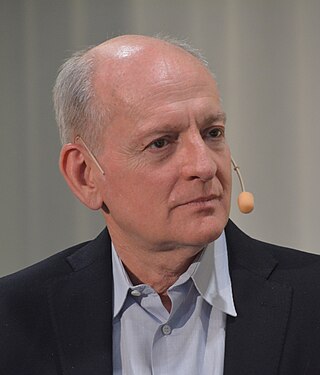Related Research Articles

Douglas Bruce Lenat is the CEO of Cycorp, Inc. of Austin, Texas, and has been a prominent researcher in artificial intelligence. Lenat was awarded the biannual IJCAI Computers and Thought Award in 1976 for creating the machine-learning program AM. He has worked on machine learning, knowledge representation, "cognitive economy", blackboard systems, and what he dubbed in 1984 "ontological engineering". He has also worked in military simulations, and numerous projects for US government, military, intelligence, and scientific organizations. In 1980, he published a critique of conventional random-mutation Darwinism. He authored a series of articles in the Journal of Artificial Intelligence exploring the nature of heuristic rules.

In artificial intelligence, symbolic artificial intelligence is the term for the collection of all methods in artificial intelligence research that are based on high-level symbolic (human-readable) representations of problems, logic and search. Symbolic AI used tools such as logic programming, production rules, semantic nets and frames, and it developed applications such as knowledge-based systems, symbolic mathematics, automated theorem provers, ontologies, the semantic web, and automated planning and scheduling systems. The Symbolic AI paradigm led to seminal ideas in search, symbolic programming languages, agents, multi-agent systems, the semantic web, and the strengths and limitations of formal knowledge and reasoning systems.

Stuart Jonathan Russell is a British computer scientist known for his contributions to artificial intelligence (AI). He is a professor of computer science at the University of California, Berkeley and was from 2008 to 2011 an adjunct professor of neurological surgery at the University of California, San Francisco. He holds the Smith-Zadeh Chair in Engineering at University of California, Berkeley. He founded and leads the Center for Human-Compatible Artificial Intelligence (CHAI) at UC Berkeley. Russell is the co-author with Peter Norvig of the authoritative textbook of the field of AI: Artificial Intelligence: A Modern Approach used in more than 1,500 universities in 135 countries.
Hybrid intelligent system denotes a software system which employs, in parallel, a combination of methods and techniques from artificial intelligence subfields, such as:

In the history of artificial intelligence, an AI winter is a period of reduced funding and interest in artificial intelligence research. The field has experienced several hype cycles, followed by disappointment and criticism, followed by funding cuts, followed by renewed interest years or even decades later.

The following outline is provided as an overview of and topical guide to artificial intelligence:
John Yen is Professor of Data Science and Professor-in-Charge of Data Science in the College of Information Sciences and Technology at Pennsylvania State University. He currently leads the Laboratory of AI for Cyber Security at Penn State. He was the founder and a former Director of the Cancer Informatics Initiative there.

Nils John Nilsson was an American computer scientist. He was one of the founding researchers in the discipline of artificial intelligence. He was the first Kumagai Professor of Engineering in computer science at Stanford University from 1991 until his retirement. He is particularly known for his contributions to search, planning, knowledge representation, and robotics.
Drew McDermott was a professor of Computer Science at Yale University. He was known for his contributions in artificial intelligence and planning.
Dr. Robert L. Simpson Jr. is a computer scientist whose primary research interest is applied artificial intelligence. He served as Chief Scientist at Applied Systems Intelligence, Inc. (ASI) working with Dr. Norman D. Geddes, CEO. Dr. Simpson was responsible for the creation of the ASI core technology PreAct. ASI has since changed its name to Veloxiti Inc.

Nicholas Robert Jennings is a British computer scientist and the current Vice-Chancellor and President of Loughborough University. He was previously the Vice-Provost for Research and Enterprise at Imperial College London, the UK's first Regius Professor of Computer Science, and the inaugural Chief Scientific Adviser to the UK Government on National Security. His research covers the areas of AI, autonomous systems, agent-based computing and cybersecurity. He is involved in a number of startups including Aerogility, Contact Engine, Crossword Cyber Security, and Reliance Cyber Science. He is also an adviser to Darktrace, a member of the UK Government's AI Council, chair of the National Engineering Policy Centre and a council member for the Engineering and Physical Sciences Research Council.
In the philosophy of artificial intelligence, GOFAI is classical symbolic AI, as opposed to other approaches, such as neural networks, situated robotics, narrow symbolic AI or neuro-symbolic AI. The term was coined by philosopher John Haugeland in his 1985 book Artificial Intelligence: The Very Idea.

Eric Poe Xing is an American computer scientist whose research spans machine learning, computational biology, and statistical methodology. Xing is founding President of the world’s first artificial intelligence university, Mohamed bin Zayed University of Artificial Intelligence (MBZUAI).

Francesca Rossi is an Italian computer scientist, currently working at the IBM T.J. Watson Research Lab as an IBM Fellow and the IBM AI Ethics Global Leader.

Salvatore J. Stolfo is an academic and professor of computer science at Columbia University, specializing in computer security.
Thomas G. Dietterich is emeritus professor of computer science at Oregon State University. He is one of the pioneers of the field of machine learning. He served as executive editor of Machine Learning (journal) (1992–98) and helped co-found the Journal of Machine Learning Research. In response to the media's attention on the dangers of artificial intelligence, Dietterich has been quoted for an academic perspective to a broad range of media outlets including National Public Radio, Business Insider, Microsoft Research, CNET, and The Wall Street Journal.
The Information Innovation Office (I2O) is one of the seven technical offices within DARPA, an agency of the U.S. Department of Defense that is responsible for the development of advanced technology for national security. I2O was created in 2010 by combining the Information Processing Techniques Office (IPTO) and the Transformational Convergence Technology Office (TCTO). The office focuses on basic and applied research in the areas of cyber security, data analytics, and human-machine symbiosis.

Pieter Abbeel is a professor of electrical engineering and computer sciences, Director of the Berkeley Robot Learning Lab, and co-director of the Berkeley AI Research (BAIR) Lab at the University of California, Berkeley. He is also the co-founder of covariant.ai, a venture-funded start-up that aims to teach robots new, complex skills, and co-founder of Gradescope, an online grading system that has been implemented in over 500 universities nationwide. He is best known for his cutting-edge research in robotics and machine learning, particularly in deep reinforcement learning. In 2021, he joined AIX Ventures as an Investment Partner. AIX Ventures is a venture capital fund that invests in artificial intelligence startups.
Neuro-symbolic AI is a type of artificial intelligence that integrates neural and symbolic AI architectures to address complementary strengths and weaknesses of each, providing a robust AI capable of reasoning, learning, and cognitive modeling. As argued by Valiant and many others, the effective construction of rich computational cognitive models demands the combination of sound symbolic reasoning and efficient machine learning models. Gary Marcus, argues that: "We cannot construct rich cognitive models in an adequate, automated way without the triumvirate of hybrid architecture, rich prior knowledge, and sophisticated techniques for reasoning." Further, "To build a robust, knowledge-driven approach to AI we must have the machinery of symbol manipulation in our toolkit. Too much useful knowledge is abstract to make do without tools that represent and manipulate abstraction, and to date, the only machinery that we know of that can manipulate such abstract knowledge reliably is the apparatus of symbol manipulation."
Gregory Falco is an American inventor and researcher. Falco is a Professor at Johns Hopkins University. His work lies mainly in the area of cybersecurity research and its aerospace applications. Falco is the founding Chair of IEEE's Standard for Space System Cybersecurity.
References
- ↑ "Lab V2".
- 1 2 3 CYR3CON.AI. "About". www.cyr3con.ai. Retrieved August 7, 2019.
- 1 2 "Paulo Shakarian". New America. Retrieved August 7, 2019.
- 1 2 3 "Paulo Shakarian | iSearch". isearch.asu.edu. Retrieved August 7, 2019.
- ↑ "V.S. Subrahmanian (webpage)".
- ↑ Shakarian, Paulo. "Spatio-Temporal Reasoning about Agent Behavior". UMD dissertation.
- ↑ "Coming Home: This West Point grad is using AI and Big Data for national security". Business Insider .
- ↑ "Paulo Shakarian Associate Professor at Arizona State University". December 21, 2020.
- 1 2 3 4 5 6 7 "Books by Paulo Shakarian". www.amazon.com. Retrieved August 7, 2019.
- ↑ "AI Cyber Attack Prediction Platform CYR3CON Secures $8.2 Million Financing" (Press release). July 14, 2020.
- ↑ "Albuquerque cybersecurity firm acquires Arizona machine learning startup".
- ↑ Neuro Symbolic Reasoning and Learning.